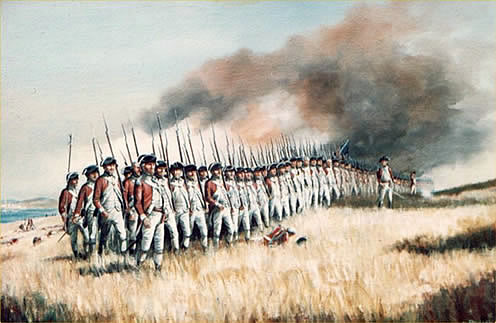« Click on Picture to
Return »
 |
|
The Marines at the Battle of Bunker Hill
17 June 1775: During the night of 16-17 June, the American rebels, tightening their grip on Boston, occupied and entrenched Breed’s Hill, overlooking the harbour. (Their orders specified the fortification of Bunker Hill, which was a little higher). Next day Major-General William Howe, commanding the 2,200-strong British force, counter-attacked. He underestimated the tenacity of his opponents, and relied solely on shock action with the bayonet. Ordered to advance with unloaded muskets, the British sustained needlessly heavy losses. The Americans, behind entrenchments, rail fences and stone walls, repulsed two assaults, but their ammunition supply failed during the third assault and they were driven off the hill. 1,054 British troops were killed or wounded. Although the engagement left the local situation unchanged, the fact that the Americans had made so determined a stand against regular troops provided a boost to their morale.
On the left flank of the British, the houses of Charlestown were in flames. The 2nd Marine battalion took part in the Battle of Bunker Hill. Major Pitcairn was commander of the final assault on Colonel Prescott's redoubt. In the summer heat he led his Marines, including his son Thomas, (a Lieutenant aged 19), on foot up the hill for the final assault. While advancing, they marched through another line of infantry who were being pushed back by heavy rebel fire. Pitcairn told them to "Break and let the Marines through!", and is said to have threatened to "bayonet the buggers" if they would not get out of the Marines' way! He waved his sword and urged his men on: "Now, for the glory of the Marines!"
A musket ball struck Major Pitcairn in the breast and he fell into the arms of his son Thomas. According to one story, the rebel troops were near defeat, when Major Pitcairn ordered them to surrender. An American then stepped forward and shot Pitcairn. The British were temporarily stunned, and the Americans were able to retreat. Another story tells that the major fell dead just as he was shouting to his men, “The day is ours.”
Pitcairn's son carried his wounded father out of the line of fire to the water's edge, before returning to the battle. "I have lost my father!" he said. "We have all lost a father!" some of the Marines responded. A boat took Pitcairn back to Boston, where he was put to bed in a house on Prince Street. Although the bullet was removed and his wound dressed, he died a couple of hours later. He was 52. The fatal musket ball and his uniform buttons were returned to his wife and children.
Medium: Oil on Canvas
Owner: Private collection
Price(s):
|
|



